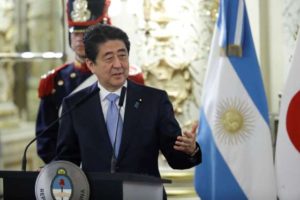Shinzo Abe is coming to America.
It’s no ordinary visit for a Japanese prime minister. Oh, no. He’s going to a place burned in the memories of millions of Americans.
Pearl Harbor awaits the visit of the first Japanese head of government since a bright sunny day in December 1941.
On Dec. 7, the United States entered World War II after its naval and air forces were attacked by Japanese bombers and fighter planes. Roughly 3,000 Americans died in that sneak attack. President Roosevelt stood before Congress the next day and declared we had been attacked “yesterday, Dec. 7, 1941, a date which will live … in infamy.”
The president sought a declaration of war; Congress gave it to him — and the world changed forever.
Prime Minister Abe is coming to Pearl Harbor to meet with President Obama.
This visit very well could mark a remarkable day of atonement for the Japanese government.
Abe said in a statement announcing the Dec. 26-27 visit: “I’d like to make it (meeting with Obama) an opportunity to send a message to the world that we will further strengthen and maintain our alliance towards the future,” he said. “And at the same time, I want to make it an opportunity to signal the value of Japan-US reconciliation.”
The prime minister’s wife, Akie, visited Pearl Harbor earlier this year, touring the USS Arizona Memorial, where she laid flowers and prayed.
There’s been a good bit of that sort of thing over the years as Japanese tourists journey to Pearl Harbor. Aging men — many of whom fought against Americans during the war — have come to Pearl Harbor to pray and to seek forgiveness for their country’s role in initiating the carnage that erupted all across the Pacific Theater after what FDR labeled a “dastardly” act.
President Obama visited Hiroshima earlier this year, speaking to the world about the dangers of nuclear weaponry. He didn’t apologize for President Truman’s decision on Aug. 6, 1945 to drop an atomic bomb on Hiroshima. Nor should he have done so.
The war ended a few days later. It’s been argued during the decades since that use of the atomic weapons on Hiroshima and Nagasaki likely saved many more lives than they took. Still, the debate continues.
Now the focus turns to Prime Minister Abe’s return visit to Pearl Harbor. Does he make amends? Does he issue a formal apology to the United States for the actions of his predecessors?
My own feeling is that an apology is due. Whatever he says, though, I am certain it will be heartfelt and will, as he said, speak to the “reconciliation” that has drawn the United States and Japan closer in the years that came after that horrible “day of infamy.”
It should be a historic and profoundly meaningful visit, depending, of course, on what the prime minister tells the world.
